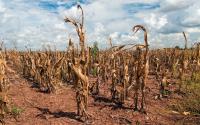In a record-breaking eight hour broadcast, Chávez hit back, saying that US President George W. Bush "and his capitalist free-market proposals are to blame for the severe political crisis that plagues Bolivia."
His counter-attack included some rare words in English from the Venezuelan leader:
"No, Mister Bush. No, Sir. I'm sorry for you..."
More excerpts from Chávez's fireside chat, plus some interesting words from outgoing Bolivian president Carlos Mesa, at the jump...
"The President of the United States came to the OAS meeting to give a slovenly speech and, his face pale, he proposed a medicine of death: He said that the salvation of Latin America is in a free market.… It is this capitalism that is generating exclusion, misery and, as a consequence, destabilization. He's like a doctor that knows that a medicine is poisoned, that it is killing people, but who keeps prescribing that medicine. That is what is killing the people of Latin America. That is what has been crushing the people, what has generated the largest inequalities we have ever known.
"We, the peoples of Latin America told him: 'No, Mister Bush. No, Sir. I'm sorry for you. Thank you. But his theory of poisoned medicine has failed.
"What is the cause of what happened in Bolivia? Fidel? Chávez? No. It's Bush. It is all that he represents. It is capitalism. Fortunately, the Bolivian people were able to open the door to a peaceful solution, but we were at the point of civil war."
"I spoke with (Bolivian) President (Carlos) Mesa, a friend, a good man. He told me, 'Chávez, well, I've come this far, I can't go any farther. I tried.' And I told him, 'Here you have a friend, you have a brother country to Bolivia.'"
"Those who say that Evo Morales is responsible are lying. From the streets he prevented the installation of another military dictatorship. If not they would have gone into civil war."
Meanwhile, in an interview with the Mexican daily El Universal, outgoing Bolivian president Carlos Mesa said: "I didn't see any evidence of Venezuelan intelligence interfering in Bolivian affairs."






